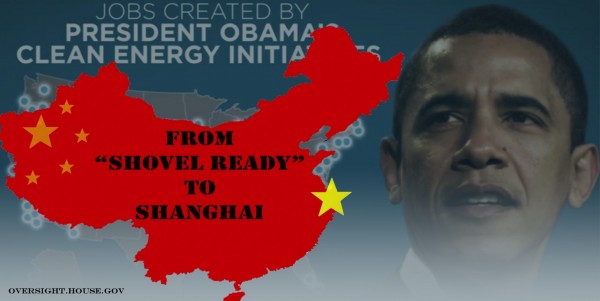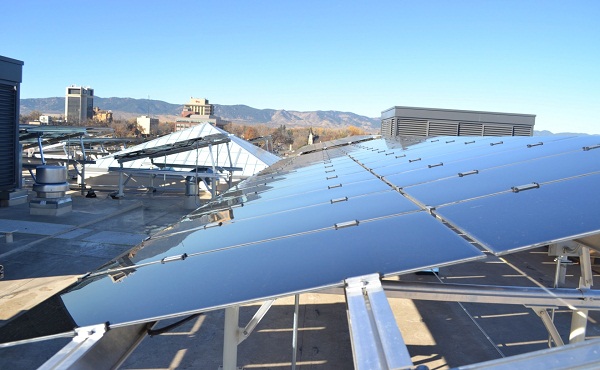House Republicans and Democrats tussled on Wednesday over the Abound Solar failure in much the way they clashed countless times before over the earlier solar loan guarantee flop – the infamous Solyndra case – but this latest go-round came with a big dose of the au courant China issue.
The hearing before the Oversight and Government Reform Committee – actually, before just a handful of members of the committee, drifting in and out of the hearing room – came two weeks after the Colorado thin-film panel manufacturer declared bankruptcy. Abound had received a $400 million loan guarantee, but the government in September cut off the company’s drawdown on the money at $70 million, when it became clear that things weren’t going quite as planned.

The Republicans did not use the hearing to congratulate the Obama administration on saving the taxpayers an additional $330 million in possible losses.
Instead, they asserted that the loan to Abound was doomed from the start, and said the assistance the company got was nothing more than an intrusion into the free market made worse by either the incompetence or the corruption of the U.S. Department of Energy officials running the program. Or maybe both.
In a new twist, the Republicans also tried to tie their critique of the loan program to the Romney campaign’s claim that President Obama’s 2009 stimulus ended up boosting job growth in China.
Rep. Mike Kelly (R-Pa.) led the charge. He mocked an Obama campaign graphic that had dots scattered across the nation, representing jobs created by the Recovery Act’s green provisions, and substituted a graphic of his own. Under the title, “Jobs Created By President Obama’s Clean Energy Initiatives,” it showed China in bright red, with the caption, “From ‘Shovel Ready’ to Shanghai.”
As an example of the clean energy program creating jobs in China, Kelly cited the Mesquite Solar I utility-scale solar PV project in Arizona, which received a $337 million loan guarantee. Kelly said the Suntech panels used at the plant, some of which come from a Suntech factory in Goodyear, Ariz., don’t count as U.S. inputs because the solar cells that go into the panels are manufactured in China. “How many jobs did we create in China using taxpayer money?” the congressman asked rhetorically.
Nonetheless, according to Suntech, the Goodyear plant has three shifts running around the clock, five days a week, and employs more than 100 Arizonans.
In addition, some 450 workers have been at work on the Mesquite job site, according to plant owner Sempra Generation, installing 4,500 panels a day. By December last year, 42 megawatts of the 150 MW plant had been completed and connected to the grid. The entire plant is expected to be done by early next year. Power from the facility is sold to the Northern California utility Pacific Gas and Electric under 20-year contract.
The Democrats on the panel, led by Rep. Elijah Cummings (D-Md.) and Dennis Kucinich (D-Ohio), responded that the Loan Guarantee Program was rigorously run and was proving to be highly successful, with a failure rate thus far that is far smaller than Congress had expected in its budgeting. They pointed out, as well, that if Abound was an example of Obama playing political favorites, it was an awfully strange one, since the company’s largest private investor was Ivus Group, led by Raymond Debbane, a big contributor to Republicans.
Most strikingly, however, the Democrats played their own China card, again and again, taking a cue from Abound CEO Craig Witsoe, who said the company was doing well with its cadmium-telluride solar panels until the China PV tsunami hit in 2011.

“Abound’s technology and business made solid progress until the second half of 2011 when panel prices dropped by 50 percent in a year due to aggressive price-cutting from Chinese competitors using older crystalline-silicon technology,” Whitsoe testified. “With over $30 billion in reported government subsidies, Chinese panel makers were able to sell below cost and put Abound out of business before we were big enough to pose a real competitive threat to China’s rapidly growing market share.”
Kucinich said the dumping of Chinese PV in the U.S. was the thing that Congress really ought to be spending its time and energy on.
“There’s a real scandal that has been underneath this and that we need to address,” Kucinich said. “That is the systematic, illegal dumping of subsidized,Chinese solar panels in the U.S. We’re attacking our own businesses here, and meanwhile the Chinese are eating our lunch in this market as we’re fighting with each other.”